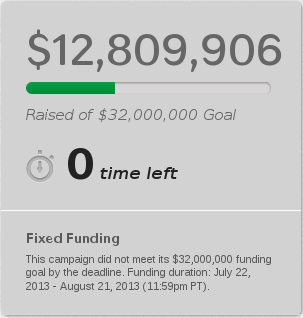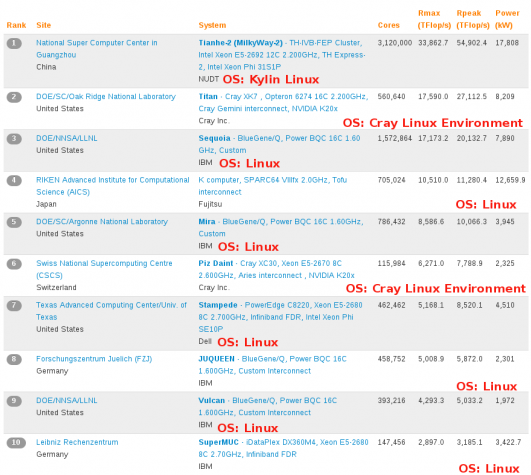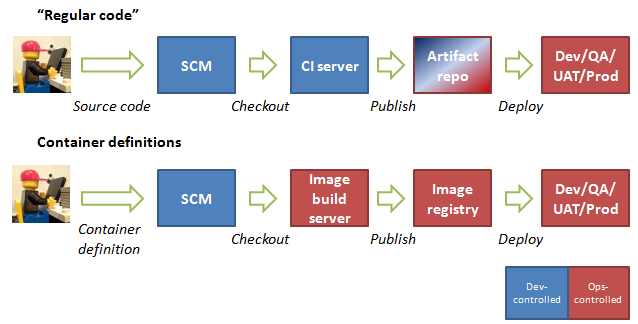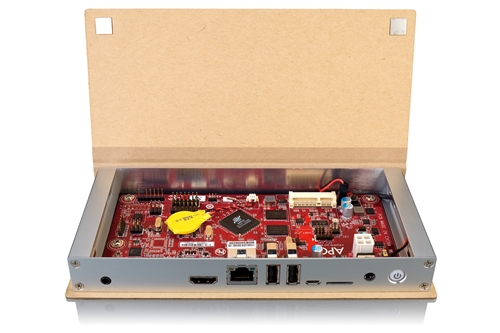At exactly 1:59 a.m. (CST) this early Thursday morning, Canonical’s attempt to raise US$32 million directly from end-users via a crowd-funding campaign for its Ubuntu Edge smartphone on Indiegogo came to an unsuccessful end.
The money was to have been used to build what has been dubbed a “superphone” that would have been able to run both Android and Ubuntu Mobile OS and also be capable of transforming into an Ubuntu PC. Canonical, the company behind the campaign, is also the commercial entity that sponsors the Ubuntu Linux distribution.
This screen shot shows how much was raised when the campaign ended.

So now, what’s next? The first step is the easy one. That is, the money raised will have to be returned to those it came from. What about the phone itself? Will it die with the campaign or is there life after Indiegogo?
From what Mark Shuttleworth as said, the effort to build this “superphone” will forge ahead. However, the route it takes to get into our hands will obviously be different. The Indiegogo campaign was overly ambitious and missed its target by more than US$19 million. However, it also set the record for the most money raised from a crowd-funding campaign.
There were mistakes made, but organizations, like individuals, learn from their mistakes. This campaign failed largely because the Big Boys in the industry were not interested, and Mark Shuttleworth could not move them to speak with their pocketbook. And this is what I’ve been saying about Mark Shuttleworth (and Canonical). He does not have the clout to line up major players in the field in any meaningful way behind any of his efforts, whether it is Ubuntu for TV or Ubuntu Mobile.
That’s why all his efforts to make Ubuntu a relevant player in the mobile arena have been an uphill struggle. It has not been easy. But like he told The Guardian, the task “is a challenging proposition. But I wasn’t made for the easy ones.”








As far as I see it? they might have “failed’ to raise the money, but they “succeeded” in proving that you don’t NEED the pockets of Steve Ballmer….Bill Gates…or the companies like Samsung or Apple! Imagine that in less than a month this group of people raised over 12 MILLION DOLLARS!? I might not be business savvy, but I know I could at least START a company with 12 million dollars!….with money left over if i budget right! This whole effort wasn’t just to get money, but to prove that all you need is a solid idea, even better technology, and the belief of millions of people who are willing to take the risk of supporting something that the technology world can REALLY use, and not just another clone of something that’s already out there! I say Bravo to Mr. Shuttleworth, and to anyone else that has the “testicular fortitude” to step out on a very thin and treacherous limb and do something left of center!
Well it was a good effort. The phone specs are better then any others I’ve seen and I was wanting to get my hands on one. Maybe it can still happen even tho now you have people who say you can’t go up against Samsung, or Apple and ever hope to do any good. People said the same thing about Nokia also but they are becoming quite successful in their own right. I’ve read that there are many carriers that are willing to subsidize an Ubuntu phone. I would be one of the ones waiting in line. As a matter of fact, I really need a new phone now but I’ll wait as long as I can just to see what happens. Android would be okay, iOS is out of the question because of being so locked down, and I feel the same about a Windows phone. So in the end I may have to settle for an Ubuntu flashed Nexus. The future contains many possibles to look forward to and I’ve never really been one to just play with the big dogs. Where’s the fun in that 😉
Great idea, bad execution!
I’m not into smartphones, so this is of no concern to me. I’m just waiting for an Open Source tablet.
I’ve never owned one either. I’m one of the few. An Open Source tablet sounds very interesting. Something to look forward to and no locks please.